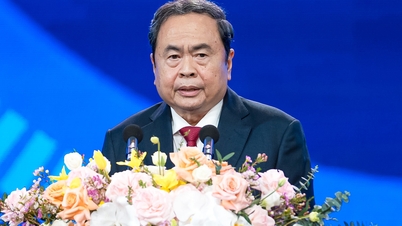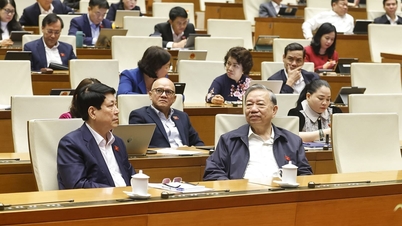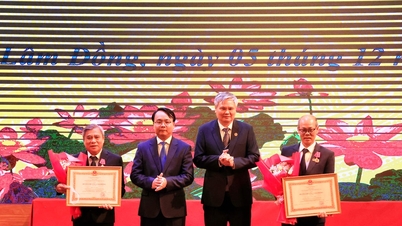
Not only to control risks, the Law also affirms that data is a national resource, creating a legal corridor to promote innovation, protect people's rights and strengthen Vietnam's digital sovereignty in the new era.
Filling the legal gap
AI is not only an applied technology but is becoming a national intellectual infrastructure. With the ability to analyze data at high speed, forecast trends, and simulate behavior, AI has become a new productive force of the digital age, present in almost all fields: from healthcare, education, transportation, agriculture , finance, urban management, environment to defense and security.
In recent years, Vietnam has focused on AI training at many levels, expanding international cooperation, forming research programs and teams of experts. The government promotes the innovation ecosystem, encourages investment, establishes research centers, laboratories and AI alliances. The AI popularization movement is likened to "popular education" of technology, aiming for each citizen to have a digital assistant. According to the AI Readiness Index of Oxford Insights, in 2024, Vietnam will rank 51/188 countries, 9th in East Asia and 5th in ASEAN. Master Doan Huu Hau, Director of FPT Digital Transformation Center, said that Vietnam has hundreds of AI startups and nearly 80% of enterprises have applied AI. Promoting application in enterprises and state agencies is the fastest way to develop the domestic market, creating enterprises capable of reaching out internationally. However, the big challenges are still vision, human resources, data quality and budget.
Chairman of the Board of Directors and General Director of Bkav Nguyen Tu Quang said that the bottleneck is the lack of standardization and connection of data. He proposed a unified data standard to create fair competition and effective connectivity. Vietnam can become an AI center thanks to a team of good experts at large corporations. The State needs to stimulate demand, encourage businesses to submit "tasks" to technology and be willing to pay when the solution is effective. According to Dr. Tran Van Khai, Deputy Chairman of the National Assembly's Committee on Science, Technology and Environment, it is necessary to soon promulgate the AI Law to promote safe development, control risks and protect people. This period is the right time to create a legal corridor for AI development and management.
Legal regulations for AI development are gradually taking shape. The 2025 Digital Technology Industry Law for the first time affirms that data is a “new means of production” and AI is a “new method of production”, marking a turning point in development thinking. Research forecasts that, if implemented synchronously, AI can contribute about 79.3 billion USD, equivalent to 12% of Vietnam’s GDP by 2030. These goals can only be achieved when closely linked with the Party’s strategic vision, specified in the resolution and the Digital Technology Industry Law, creating the foundation for the promulgation of the AI Law.
At the recent national science conference, Minister of Science and Technology Nguyen Manh Hung said that the National Technology Innovation Fund (NATIF) will spend at least 40% of its budget to support AI, providing vouchers for small businesses to deploy solutions. But AI is a rapidly changing field, so the AI Strategy needs to be updated. By the end of this year, we will have an update to the National AI Strategy and the AI Law.
Developing safe, sustainable and humane AI
Major General Nguyen Ngoc Cuong, Director of the National Data Center, pointed out the challenge of having a lot of data but a lack of connection. Currently, the country has more than 80 million internet users, 150 million mobile subscribers and millions of businesses, but the data management system is not yet synchronized. Vietnam needs to soon build a unified data management system with four pillars: institutions, technology, processes and people, including perfecting the legal framework on data ownership, use and sharing; building a national data infrastructure; standardizing the collection and processing process; and training a team of data management experts.
The AI Law needs to codify important policies such as: Humane AI principles; risk management and transparency; data infrastructure development; promoting innovation; clearly defining the legal responsibilities of relevant parties...
Besides positive results, AI in Vietnam still shows many limitations: Lack of experts, training does not meet demand; weak research infrastructure; slow development of the semiconductor industry; limited R&D investment. Notably, the big challenge is the lack of a synchronous legal framework. The current legal system lacks data standards, accountability mechanisms and technology testing regulations. This is a gap that requires a separate law - the AI Law to develop in parallel with safety.
Dr. Ho Duc Thang, Director of the National Institute of Digital Technology and Digital Transformation (Ministry of Science and Technology), shared that the urgent issue now is not only standards but also data standards, because Vietnam has only built about 5-6 standards. He said that the AI Law needs to be based on seven core principles to ensure safe, sustainable, and responsible development. In which, it needs to be flexible and adaptive to allow the legal framework to adjust according to technological advances.
“The AI Law needs to codify important policies such as: Humane AI principles; risk management and transparency; data infrastructure development; promoting innovation; clearly defining the legal responsibilities of relevant parties...”, said Deputy Secretary General of the National Data Association Nguyen Thi Tuyet Nhung.
Minister of Science and Technology Nguyen Manh Hung emphasized that a national AI code of ethics will be issued, in harmony with international standards but designed to suit Vietnamese practice. Along with that, the development of the AI Law and the National AI Strategy will be oriented according to core viewpoints: Risk-based management; transparency and accountability; encouraging domestic development and autonomy in AI; using AI as a driving force for rapid and sustainable growth; protecting digital sovereignty. In particular, data, infrastructure and AI technology are identified as three strategic pillars.
Source: https://nhandan.vn/tao-hanh-lang-phap-ly-thuc-day-doi-moi-sang-tao-post909825.html


![[Photo] National Assembly Chairman Tran Thanh Man attends the VinFuture 2025 Award Ceremony](/_next/image?url=https%3A%2F%2Fvphoto.vietnam.vn%2Fthumb%2F1200x675%2Fvietnam%2Fresource%2FIMAGE%2F2025%2F12%2F05%2F1764951162416_2628509768338816493-6995-jpg.webp&w=3840&q=75)
![[Photo] 60th Anniversary of the Founding of the Vietnam Association of Photographic Artists](/_next/image?url=https%3A%2F%2Fvphoto.vietnam.vn%2Fthumb%2F1200x675%2Fvietnam%2Fresource%2FIMAGE%2F2025%2F12%2F05%2F1764935864512_a1-bnd-0841-9740-jpg.webp&w=3840&q=75)

















![[Photo] National Assembly Chairman Tran Thanh Man attends the VinFuture 2025 Award Ceremony](https://vphoto.vietnam.vn/thumb/402x226/vietnam/resource/IMAGE/2025/12/05/1764951162416_2628509768338816493-6995-jpg.webp)
![[Infographic] Air pollution and recommendations from the Ministry of Health](https://vphoto.vietnam.vn/thumb/402x226/vietnam/resource/IMAGE/2025/12/05/1764950568593_screen-shot-2025-12-05-at-222015-png.webp)
















































































Comment (0)